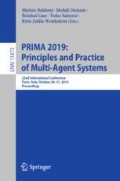Abstract
We place ourselves in a decision making setting where a set of agents needs to collectively decide upon a set of alternatives characterised by their features. We introduce the notion of unshared features and show that if such features do not exist then we can reach a Condorcet consensus. We provide a deliberation protocol that ensures that, after its completion, the number of unshared features of the decision problem can only be reduced.
Access this chapter
Tax calculation will be finalised at checkout
Purchases are for personal use only
Notes
- 1.
The pairwise majority aggregation method is known to be unanimous, independent to irrelevant alternatives and non-dictatorial.
- 2.
Please note that Dietrich et al. [6] suppose that agents can have a preference relation over features and thus they can discriminate between two alternatives satisfying the same number of desired features. Intuitively, the importance given to a feature depends on the context.
- 3.
In this case, the Condorcet winner is the most preferred alternative of the median voter [3].
- 4.
Case of the Condorcet paradox for example.
- 5.
Please note that for simplicity purposes, we assume here that both phases always succeed, i.e. all the agents manage to agree on a set of desired features and on the features satisfied by the alternatives.
- 6.
This observation is in line with the experimental results obtained by List et al. [12] in 2012.
References
Arrow, K.J.: Social Choice and Individual Values. Wiley, New York (1951)
Besnard, P., Hunter, A.: A logic-based theory of deductive arguments. Artif. Intell. 128(1–2), 203–235 (2001)
Black, D.: The median voter theorem. J. Polit. Econ. 56(1), 23–34 (1948)
Brandt, F., Conitzer, V., Endriss, U., Lang, J., Procaccia, A.D.: Handbook of Computational Social Choice, 1st edn. Cambridge University Press, New York (2016)
de Condorcet, M.J.A.N.C.M.: Essai sur l’application de l’analyse à la probabilité des décisions rendues à la pluralité des voix. L’imprimerie royale (1785)
Dietrich, F., List, C.: Where do preferences come from ? Int. J. Game Theory 42(3), 613–637 (2013)
Dung, P.M.: On the acceptability of arguments and its fundamental role in nonmonotonic reasoning, logic programming and n-person games. Artif. Intell. 77(2), 321–357 (1995)
Gehrlein, W.V.: Consistency in measures of social homogeneity: a connection with proximity to single peaked preferences. Qual. Quant. 38(2), 147–171 (2004)
Gehrlein, W.V.: Probabilities of election outcomes with two parameters: the relative impact of unifying and polarizing candidates. Rev. Econ. Des. 9(4), 317–336 (2005)
Guilbaud, G.T.: Les théories de l’intérêt général et le problème logique de l’agrégation. Économie appliquée 5, 501–584 (1952)
Inada, K.I.: A note on the simple majority decision rule. Econometrica: J. Econometric Soc. 32, 525–531 (1964)
List, C., Luskin, R.C., Fishkin, J.S., McLean, I.: Deliberation, single-peakedness, and the possibility of meaningful democracy: evidence from deliberative polls. J. Politics 75(1), 80–95 (2012)
Niemi, R.G.: Majority decision-making with partial unidimensionality. Am. Polit. Sci. Rev. 63(2), 488–497 (1969)
Searle, J.R.: Speech Acts: An Essay in the Philosophy of Language, vol. 626. Cambridge University Press, Cambridge (1969)
Sen, A.K.: A possibility theorem on majority decisions. Econometrica: J. Econometric Soc. 34, 491–499 (1966)
Tsetlin, I., Regenwetter, M., Grofman, B.: The impartial culture maximizes the probability of majority cycles. Soc. Choice Welf. 21(3), 387–398 (2003)
Author information
Authors and Affiliations
Corresponding author
Editor information
Editors and Affiliations
Rights and permissions
Copyright information
© 2019 Springer Nature Switzerland AG
About this paper
Cite this paper
Boixel, A., Bisquert, P., Croitoru, M. (2019). Deliberation Towards Transitivity with Unshared Features. In: Baldoni, M., Dastani, M., Liao, B., Sakurai, Y., Zalila Wenkstern, R. (eds) PRIMA 2019: Principles and Practice of Multi-Agent Systems. PRIMA 2019. Lecture Notes in Computer Science(), vol 11873. Springer, Cham. https://doi.org/10.1007/978-3-030-33792-6_1
Download citation
DOI: https://doi.org/10.1007/978-3-030-33792-6_1
Published:
Publisher Name: Springer, Cham
Print ISBN: 978-3-030-33791-9
Online ISBN: 978-3-030-33792-6
eBook Packages: Computer ScienceComputer Science (R0)

